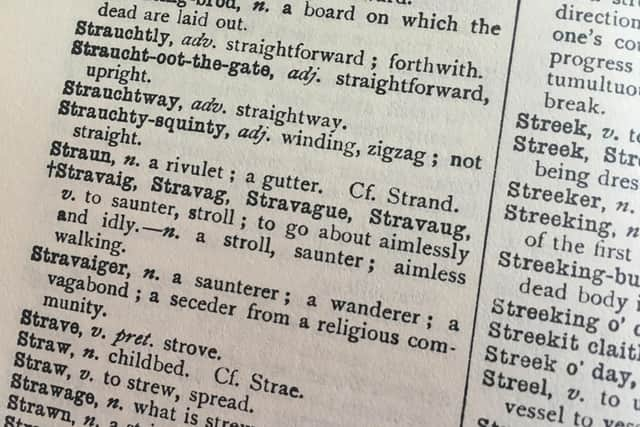New internet browser written in Scots language
A new version of the Firefox browser shows menus and settings pages written in Scots following a project by Edinburgh-based company Rubric.
A number of new Scots translations have been added to the layout of the site, with browser translated as “stravaiger” – Scots for wanderer.
Advertisement
Hide AdAdvertisement
Hide AdThe 'maximise' option is listed as ‘mak muckle’ and 'minimise' is referred to as 'mak tottie'.


The company said recognition of the Scots language had grown recently in Scottish schools, parliament, and on social media but that software had lagged behind, until now.
Translator and Scots writer Thomas Clark said Scots speakers would be “validated” with the new browser.
Mr Clark said: "For younger speakers especially, it's so important that they see that Scots is out there so they're not embarrassed about using it. Being able to access the internet through a Scots medium makes so much difference to their confidence, their development and hopefully to the status of the language."
The focus was on using terms that would be immediately understandable to Scots speakers.
Mr Clark added: "The real challenge was finding a medium between an interesting, lively, accessible Scots and making sure that it wasn't too antiquated or whimsical."
The 2011 Scottish census reported that 1.9 million people could speak, read, write or understand Scots. Despite this, there has been less drive to incorporate it into technological products than other minority languages, such as Scots Gaelic, the company said.
Ashley Douglas, writer, researcher and translator for the project, said the browser showed Scots being used as the “fully-fledged, fully functioning, fully legitimate modern language that it is”.
Advertisement
Hide AdAdvertisement
Hide AdShe said: “It's wonderful that Rubric and Mozilla are committed to doing this, and it was a real pleasure to help Rubric deliver on the goal."
Founded by Françoise and Ian Henderson in 1994, Rubric develops content strategies for global businesses.
The company regularly donates resources to volunteer projects and previously translated Firefox into Xhosa and donated Wikipedia translations of key health information during the 2014 Ebola virus epidemic in West Africa.
The Firefox Scots browser comes after music streaming site Spotify bowed to pressure and created a playlist in Scots.
The list, called Scots Language Sangs, was created after singer Iona Fyfe from Huntly, in Aberdeenshire, wrote an open letter to the company after noticing the site had similar lists in Scottish and Irish Gaelic, Manx, Cornish and Welsh.
Scots is the collective name for several Scottish dialects, including Doric, Lallans, Dundonian, Glesca and Shetland.
The language originated with the Angles who arrived in Scotland around 1,400 years ago. During the Middle Ages this language developed and grew apart from its sister tongue in England, until a distinct Scots language had evolved.
At one time Scots was the national language of Scotland, spoken by Scottish kings, and was used to write the official records of the country.
Advertisement
Hide AdAdvertisement
Hide AdIt was displaced as a national language after the political union with England in 1707 and is now recognised by the UK Government as a regional language under the European Charter for Regional and Minority Languages.
A message from the Editor:Thank you for reading this article. We're more reliant on your support than ever as the shift in consumer habits brought about by Coronavirus impacts our advertisers.
If you haven't already, please consider supporting our trusted, fact-checked journalism by taking out a digital subscription.
Comments
Want to join the conversation? Please or to comment on this article.
